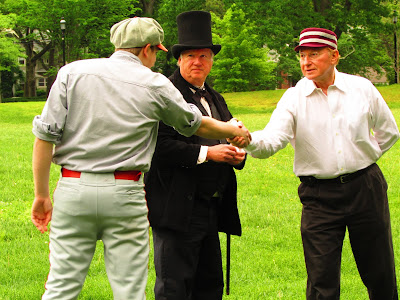Photo by Mark Granieri
After the first two Neshanock strikers went down in Flemington's half of the second, it looked the game would continue to be a low scoring affair. However the Neshanock suddenly erupted for six tallies, not all of which would have earned a lot of points for style, but counted in the score book for an 8-0 Flemington lead. From that point on the strong pitching of Danny "Lunch Meat" (aka "King," aka "Batman") Shaw and Rene "Mango" Marrero and solid defense behind them kept the home team not only off the scoreboard, but also off the bases. Flemington didn't generate a huge amount of offense either, but did tally 13 times in total led by "Mango" and Jeff "Duke" Schneider with three hits each, followed by Tom "Thumbs" Hoepfner, Joe "Mick" Murray, Chris "Low Ball" Lowry, "Lunch Meat" and Dave "Illinois" Harris with two apiece. "Illinois" also stole three bases which a was key factor in the victory or at least so he told me. Thanks also to Manny for filling in and bolstering our numbers. Now 5-3 on the season, Flemington will journey to Newtown, Pennsylvania on Memorial Day for the annual match with the hometown Strakes.
Photo by Mark Granieri
A few weeks ago, when writing about the Neshanock's bottom of the ninth inning victory over the Atlantic Club, I carefully avoided using the expression "walk-off win." Not only wasn't the term used in the 1860's, it wasn't in vogue for most of my 60 plus years of following baseball one way or another. I've since learned, however, that not only wasn't the expression "walk-off win" used in the 19th century, there was no such thing under the rules by which the Neshanock - Atlantic game was played (1864). While I probably should have realized this earlier, it was brought home when I started thinking about one of the games on the Nassau Club of Princeton's four game tour of the then independent City of Brooklyn in October of 1863. After dispatching the Resolute Club of Brooklyn in their first match, the collegians took on the Excelsior Club, a storied team from the City of Churches, largely due to their historic tour of New York state in 1860. Later that same year, the Excelsiors had some unpleasant experiences in matches with the Atlantic Club leading to a vow not to compete for the championship which doubtless cost them some talented players. Further weakening the Brooklyn club was the absence of its leader, Joe Leggett, who by 1863, unlike most of the leading players of the day, was serving in the Union Army.
Asa Brainard
At the same time, the Excelsior Club was not without talent, especially pitcher, Asa Brainard, who would go on to pitch for the Cincinnati Red Stockings and then for multiple teams in the National Association. Opposing Brainard (whose brother was his catcher) was, not surprisingly, Fred Henry, he of the deceptive, curve like pitch, and it's no surprise the game was relatively low scoring. Striking first, the Excelsiors led 2-1 after three innings and then added three runs in the fourth and two in the fifth while the visitors only managed three runs in the next three innings so that the Brooklyn club led 7-4 after six. It got worse for the Princeton team over the last three innings and heading to the bottom of the ninth, the Excelsiors had a seemingly comfortable 11-5 lead. Some of the Excelsiors may have been a little too relaxed since the Brooklyn Eagle (most likely Henry Chadwick) claimed they were paying "sundry attentions to a pail of claret punch." In any event, the combination of two Excelsior muffs and two passed balls along with some timely Nassau hitting produced seven runs for the visitors and a "walk-off" victory. But not so fast! Under the rules of the day, the team striking second had to complete their at bat or the game reverted to the last complete inning when the Excelsiors were ahead And in the gathering October dusk, it wouldn't take too long for it to be too dark to continue, in fact there were some claims that was already the case.
Joseph Leggett
One can only imagine Henry Chadwick's horror at what happened next. Two were out with Fred Henry at the striker's line and the Nassau Club star tried to speed things along by intentionally swinging and missing. This didn't sit well with the Excelsior Club who "excited" over losing a game they had seemingly won, not to mention the effects of demon rum (or in this case claret), forgot, according to Chadwick, the gentlemanly Leggett's teaching and tried to keep the game going until it had to be called for darkness. Brainard started pitching wildly and then when Henry finally hit a fly ball, catcher Harry Brainard called for all three Excelsior's circling under the ball to intentionally miss it. Fortunately, George Cook, in the words of the Sunday Mercury, "remembering the club he played for," caught the ball, restoring order and some semblance of gentlemanly behavior, not to mention a Nassau Club victory. Fortunately both papers reported that good feeling was immediately restored and the two clubs enjoyed the customary post game celebratory dinner.
New York Sunday Mercury - October 25, 1863





No comments:
Post a Comment